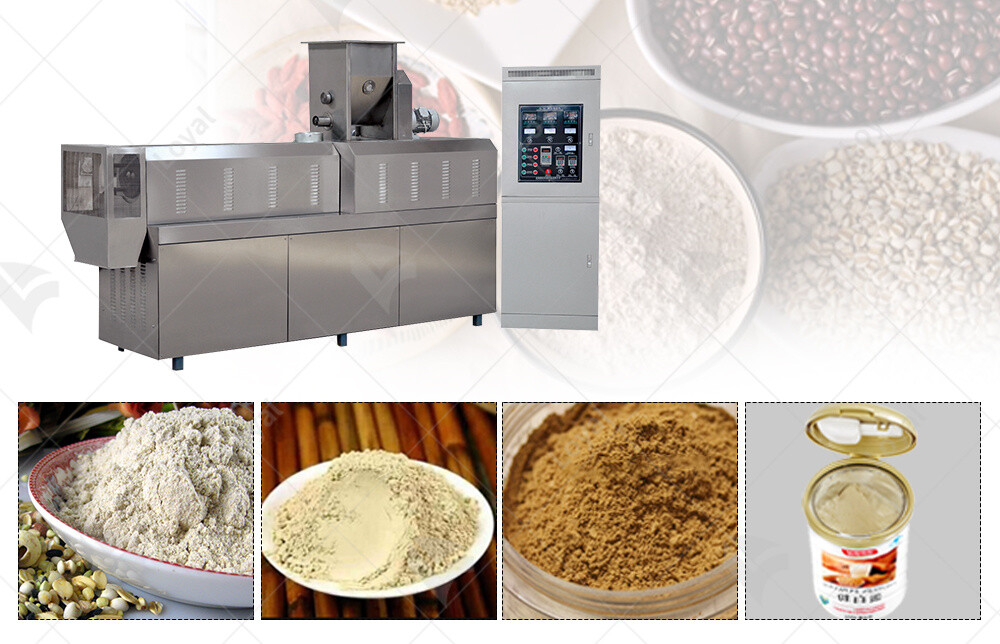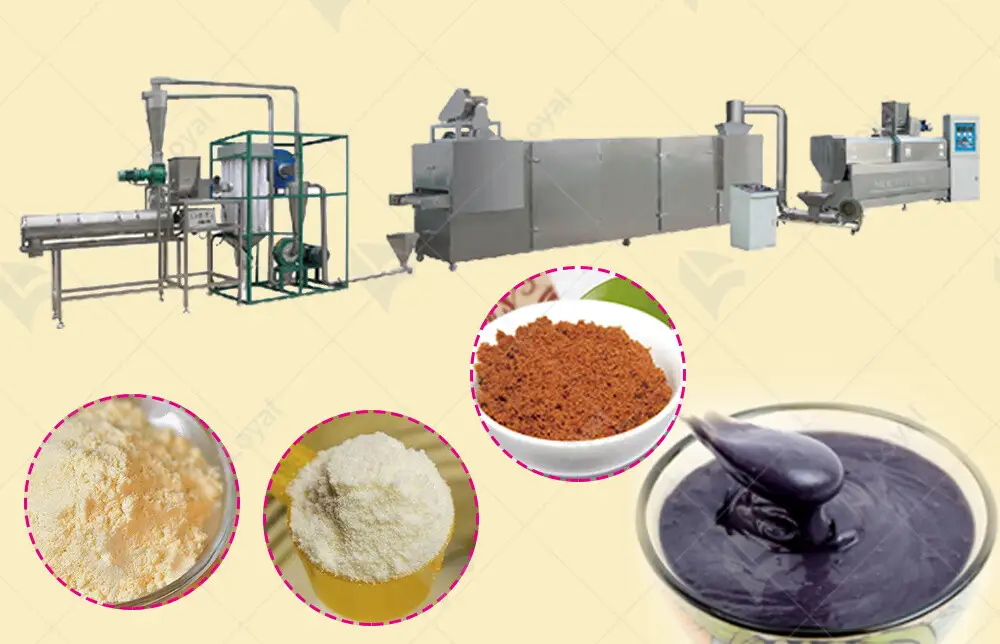The Ultimate Guide to nutritional cereals rice powder baby food processing equipment in 2024
Highlighting the Need for Innovative and Efficient Processing Equipment
In the realm of baby food production, the significance of nutritional cereals rice powder cannot be overstated. As parents continue to prioritize their infants' health and well-being, the demand for high-quality, nutrient-dense baby food has skyrocketed. Among these, rice powder derived from cereals has emerged as a staple ingredient due to its ease of digestion, hypoallergenic properties, and rich source of essential vitamins and minerals.
To meet this growing demand while ensuring product safety, consistency, and scalability, manufacturers must embrace innovative and efficient processing equipment. Traditional methods of producing nutritional cereals rice powder for baby food often involve manual labor, which can lead to inconsistencies in quality, increased risk of contamination, and limited production capacity. Moreover, these outdated processes are energy-intensive and contribute to environmental degradation.
The need for innovation in processing equipment becomes even more pronounced when considering the dynamic nature of the baby food market. Consumers today are not only seeking nutritious products but also expect them to be produced sustainably, with minimal environmental impact. This shift in consumer preferences has compelled manufacturers to invest in cutting-edge technologies that streamline production, reduce waste, and enhance overall efficiency.
Fully automated nutritional cereals rice powder baby food processing equipmentrepresents a significant leap forward in this regard. By automating key stages of the production process, these machines eliminate the need for manual intervention, thereby reducing the risk of human error and contamination. Furthermore, automation enables manufacturers to achieve precise control over ingredient measurements, mixing, blending, drying, and milling—all of which are crucial factors influencing the final quality of the product.
In addition to enhancing product quality and safety, fully automated processing equipment offers numerous operational benefits. By streamlining production processes, these machines significantly increase output, allowing manufacturers to meet the growing demand for baby food while maintaining profitability. Moreover, automation reduces labor costs and enables manufacturers to allocate resources more effectively, further boosting their competitive edge in the market.
In conclusion, the need for innovative and efficient processing equipment in the production of nutritional cereals rice powder baby food is undeniable. As the baby food industry continues to evolve, manufacturers must stay ahead of the curve by embracing advanced technologies that optimize production, ensure product quality and safety, and minimize environmental impact. Fully automated processing equipment is the key to unlocking these benefits and driving the industry towards a more sustainable and prosperous future.

Advantages of Fully Automated Processing Equipment
The integration of fully automated nutritional cereals rice powder baby food processing equipmentinto modern manufacturing facilities offers a myriad of advantages that significantly enhance productivity, product quality, and overall operational efficiency. As an industrial food machinery expert, I'd like to delve into the key benefits that this technology brings to the table.
Enhanced Product Consistency and Quality | One of the most significant advantages of fully automated processing equipment is its ability to ensure consistent product quality. By eliminating human intervention in critical stages of the production process, such as ingredient weighing, mixing, and milling, automation minimizes the risk of errors and inconsistencies. This results in baby food products that are not only nutritious but also meet the highest standards of quality and safety, providing parents with peace of mind. |
Increased Production Capacity and Efficiency | Another crucial advantage is the boost in production capacity and efficiency. Fully automated machines are designed to operate continuously, with minimal downtime for maintenance or adjustments. This allows manufacturers to scale up production quickly and efficiently, meeting the growing demand for baby food without compromising on quality. Furthermore, automation streamlines processes, reducing waste and energy consumption, which in turn leads to cost savings and a more sustainable production model. |
Reduced Labor Costs and Improved Work Environment | By automating repetitive and labor-intensive tasks, manufacturers can significantly reduce their labor costs. This not only frees up resources for other value-added activities but also creates a safer and more ergonomic work environment for employees. Automated machines require minimal supervision, allowing workers to focus on more complex or creative tasks, enhancing job satisfaction and overall productivity. |
Enhanced Traceability and Compliance | In today's highly regulated food industry, traceability and compliance are paramount. Fully automated processing equipment often comes equipped with advanced monitoring and control systems that provide real-time data on production parameters, ingredient usage, and quality control metrics. This information is crucial for ensuring compliance with regulatory requirements and facilitating product recalls, if necessary. Moreover, automation simplifies the tracking of raw materials and finished products, making it easier for manufacturers to maintain accurate records and demonstrate their commitment to transparency and accountability. |
Flexibility and Adaptability | Lastly, fully automated processing equipment offers a high degree of flexibility and adaptability. Modern machines are often designed with modular components that can be easily reconfigured or upgraded to accommodate changes in product formulations, production volumes, or market demands. This ensures that manufacturers can stay agile and responsive to evolving consumer preferences and industry trends. |
In conclusion, the advantages of fully automated nutritional cereals rice powder baby food processing equipment are numerous and far-reaching. From enhanced product consistency and quality to increased production capacity and efficiency, automation offers a comprehensive solution for manufacturers looking to streamline their operations, reduce costs, and maintain a competitive edge in the market.
Key Features of Innovative Nutritional Cereals Rice Powder Processing Equipment
Innovative fully automated nutritional cereals rice powder baby food processing equipment stands as a testament to the relentless pursuit of excellence in the food machinery industry. As an industrial food machinery expert, I'm delighted to highlight the key features that distinguish these cutting-edge systems from traditional processing methods.
1. Precision Ingredient Handling and Mixing
One of the defining features of these innovative machines is their precision in handling and mixing ingredients. Equipped with advanced weighing systems and high-speed mixers, these systems ensure that every batch of rice powder is formulated with exact proportions of nutrients, vitamins, and minerals. This precision not only guarantees consistent product quality but also optimizes the nutritional value of the final product, meeting the unique needs of growing infants.
2. Advanced Milling and Grinding Technology
Another key feature is the utilization of advanced milling and grinding technology. These machines employ precision-engineered milling heads and cutting-edge grinding mechanisms that transform rice grains into a fine, uniform powder. This process not only enhances the solubility and digestibility of the rice powder but also ensures that all the nutrients are evenly distributed throughout the product.
3. Automated Cleaning and Sterilization Systems
Innovative processing equipment also incorporates automated cleaning and sterilization systems. These systems ensure that all components of the machine are thoroughly cleaned and sanitized after each production cycle, minimizing the risk of cross-contamination and ensuring the highest standards of hygiene and safety. This feature is particularly crucial in the production of baby food, where even the slightest contamination can have severe consequences.
4. Intelligent Control and Monitoring Systems
These machines are equipped with intelligent control and monitoring systems that provide real-time data on production parameters, such as temperature, humidity, and ingredient flow rates. This information is crucial for maintaining optimal processing conditions and ensuring that the final product meets all quality and safety standards. Additionally, these systems enable remote monitoring and troubleshooting, reducing downtime and improving overall operational efficiency.
5. Modular Design for Flexibility and Scalability
Finally, innovative nutritional cereals rice powder processing equipment boasts a modular design that offers unparalleled flexibility and scalability. This means that manufacturers can easily customize their machines to suit their specific production needs, whether it's adjusting production volumes, changing product formulations, or integrating new technologies. This modularity also facilitates future upgrades and expansions, ensuring that the equipment remains relevant and competitive in a rapidly evolving market.
 Optimal Output Achieved with Fully Automated Processing
Optimal Output Achieved with Fully Automated Processing
In the realm of food machinery, the pursuit of optimal output is a paramount objective, particularly when it comes to the production of nutritional cereals rice powder baby food. Innovative fully automated processing equipment has revolutionized this sector, enabling manufacturers to achieve unprecedented levels of productivity, efficiency, and product quality. As an industrial food machinery expert, I will delve into how these advanced systems contribute to achieving optimal output.
Streamlined Production Processes | At the heart of fully automated nutritional cereals rice powder baby food processing equipment lies a streamlined production process. These machines are designed to seamlessly integrate various production stages, from ingredient handling and mixing to milling, drying, and packaging. This eliminates the need for manual intervention, reducing errors and minimizing downtime. As a result, manufacturers can maintain a consistent flow of production, ensuring that their facilities operate at peak capacity and achieve optimal output. |
Increased Production Capacity | Fully automated processing equipment significantly boosts production capacity. These machines are capable of handling larger volumes of raw materials and producing greater quantities of finished products in shorter timeframes. This increased capacity not only helps manufacturers meet the growing demand for nutritional cereals rice powder baby food but also allows them to capitalize on economies of scale, reducing production costs and enhancing profitability. |
Consistent Product Quality | Another key factor contributing to optimal output is the consistent product quality achieved through fully automated processing. These machines are equipped with advanced sensors and control systems that monitor and adjust production parameters in real-time. This ensures that every batch of rice powder is processed under optimal conditions, resulting in a uniform, high-quality product that meets or exceeds industry standards. This consistency in product quality is essential for building brand loyalty and maintaining consumer trust. |
Reduced Waste and Losses | Fully automated processing also minimizes waste and losses. By precisely controlling ingredient usage and optimizing production processes, these machines significantly reduce the amount of raw materials that go to waste. Additionally, the automated cleaning and sterilization systems prevent contamination and ensure that no finished products are discarded due to hygiene concerns. This reduction in waste and losses translates directly into increased profitability and a smaller environmental footprint. |
Enhanced Operational Efficiency | Lastly, fully automated processing enhances operational efficiency by eliminating manual labor and reducing the need for human intervention. This not only reduces the risk of human error but also frees up employees to focus on more value-added tasks, such as quality control and process improvement. As a result, manufacturers can operate their facilities more efficiently, further driving up production output and reducing costs. |
 Environmental and Sustainability Benefits
Environmental and Sustainability Benefits
Reduced Carbon Footprint | Fully automated processing equipment significantly reduces the carbon footprint associated with the production of nutritional cereals rice powder baby food. By optimizing production processes and enhancing operational efficiency, these machines minimize energy consumption and reduce greenhouse gas emissions. The use of advanced control systems ensures that machines operate at optimal levels, reducing energy waste and maximizing the energy-to-product ratio. Furthermore, the integration of renewable energy sources, such as solar or wind power, can further reduce the environmental impact of these facilities. |
Waste Minimization | One of the most significant environmental benefits of fully automated processing is waste minimization. These machines are designed to precisely control ingredient usage, reducing the amount of raw materials that go to waste. Automated cleaning and sterilization systems prevent contamination and ensure that no finished products are discarded due to hygiene concerns. Additionally, the ability to recycle and repurpose by-products and waste streams can further reduce waste generation and promote circular economy practices. |
Water Conservation | Water is a precious resource, and its conservation is crucial for sustainable food production. Fully automated nutritional cereals rice powder baby food processing equipment often incorporates advanced water management systems that minimize water consumption and optimize water usage. These systems may include water recycling and reuse mechanisms, as well as precision control over water flow and usage during various production stages. By conserving water, these machines contribute to the preservation of this vital resource and reduce the environmental impact of food production. |
Reduced Packaging Waste | Another important aspect of sustainability in food production is packaging waste. Fully automated processing equipment often integrates with advanced packaging systems that utilize eco-friendly materials and minimize packaging waste. These systems may include automated packaging machines that precisely measure and dispense packaging materials, reducing excess and waste. Additionally, the use of recyclable or biodegradable packaging materials can further reduce the environmental impact of the final product. |
 Reference
Reference
The following are five authoritative foreign literature websites in the field of Industrial food machinery:
1. Food Engineering Magazine
Website: https://www.foodengineeringmag.com/
2.Food Processing Magazine
Website: https://www.foodprocessing.com/
3.Journal of Food Engineering
Website:https://www.journals.elsevier.com/journal-of-food-engineering
4. Food Manufacturing Magazine
Website:https://www.foodmanufacturing.com/
5. International Journal of Food Science & Technology
Website:https://onlinelibrary.wiley.com/













